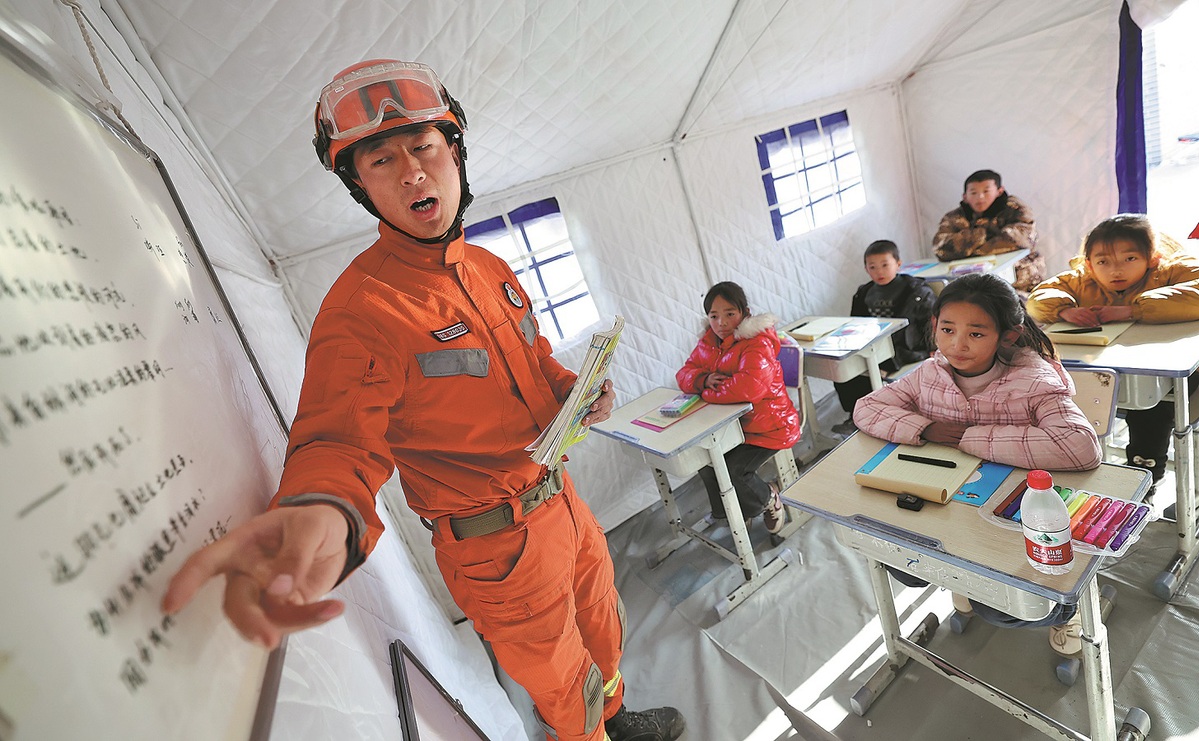Tent schools set up so students don't fall behind
By Yang Zekun and Ma Jingna in Linxia, Gansu | China Daily | Updated: 2023-12-25 09:27

Authorities coordinating to ensure classes continue after 6.2-magnitude earthquake
Despite temperatures still lingering below freezing, the sound of children reading out loud has started echoing inside the temporary shelters for the affected population after the earthquake in Jishishan county in Gansu province.
Several rescue teams, in collaboration with local schoolteachers, have set up "tent schools" for children in affected villages, so that schooling can continue in the wake of the disaster.
On Dec 21, at the settlement point for earthquake-affected residents in Shiyuan village, members of the Gansu Forest Fire Brigade set up a tent school teaching science, health and culture.
"Due to the earthquake's impact, children can't attend school. To make the best use of this time, we opened tent schools teaching children while ensuring their safety," said Zhang Peng, a member of the brigade.
There are 10 students in each class in Shiyuan, with each lesson lasting 30 minutes. Depending on the on-site conditions, additional courses such as physical education, mathematics and art will be introduced, Zhang said.
Han Yongping, 36, the principal of Shiyuan Village Primary School, is responsible for psychological counseling and teaching Chinese courses. He emphasizes the need to calm the children and their parents first, providing psychological counseling to help them move beyond the shadows of the earthquake and overcome fear.
For many children and adults, this is their first experience with an earthquake, he said.
The primary school has six grades, 107 students and 12 teachers. Han said that the school conducts emergency drills once a week. Just a day before the earthquake, students were taught safety emergency science, how to prevent carbon monoxide poisoning, and how to respond during an earthquake.
Han said there has been no news of any injured students or teachers.
After the earthquake, he and his colleagues contacted each student's parents to ensure that their basic needs were met.
The school is considering online classes to make up for the missed lessons and is preparing to apply to the higher education authorities to establish a temporary school for the children.
The original teaching building has developed cracks due to the earthquake and is unsafe, the principal said. The teachers there are planning to utilize available desks and chairs to ensure that no child misses a lesson.
The establishment of temporary schools requires strict safety measures, ensuring post-earthquake safety and addressing issues related to the use of fire and electricity, he said.
Han and his colleagues plan to return to the teaching building, while ensuring safety, to retrieve the students' textbooks.
All teachers are at the disaster settlement point, and after confirming the safety of their homes, they are all involved in the transportation of emergency supplies, he said.
"The disaster has happened, but life and students' study must go on. We need to respond positively, take proactive self-rescue measures, and not just wait for assistance," said Han.
Han lives about 40 kilometers away from the school. On the night of Dec 18, he stayed at the school, and since then, he has been living in a tent, and hasn't returned home. Despite hearing the news his own house had collapsed, the principal said that he was most concerned that his parents, wife and children were unharmed during the earthquake.
At 3 am on Dec 19, three hours after the earthquake struck, the Gansu Provincial Department of Education sent a task force to Jishishan county for emergency response and rescue efforts.
At 5:10 am on Dec 19, the task force held an online coordination meeting at the Jishishan county education bureau, establishing a front-line command center with five earthquake relief teams. Three assessment teams were dispatched to the three most severely affected townships to investigate the impact on teachers and students and assess damage to students' homes.
Both Linxia Hui autonomous prefecture and Jishishan county organized specialized teams to comprehensively assess schools within their jurisdiction. The county assessed 243 schools with over 48,000 students, while the prefecture assessed 2,048 schools with more than 498,000 students. Students from Jishishan county's boarding schools have all been evacuated and relocated.
Gansu's education authorities also convened a meeting to review and coordinate efforts.
They activated emergency plans to ensure the smooth progress of the 2024 postgraduate admissions examination on Saturday and Sunday.
The provincial department of education guided the Linxia prefecture education bureau to assess examination centers in Linxia, conducting a thorough check on invigilators, examiners and their families. Meanwhile, a dedicated team was formed to contact all 1,240 examinees from Jishishan county, ensuring their participation in the exam as scheduled.
Ma Yonghong, deputy director of the education bureau of Jishishan county, said that all local teachers were arranged to go to relocation sites for psychological counseling and teaching assistance on Thursday.
More than 4,900 high school students in the county resumed online classes on Friday, and junior high schools will conduct online classes from Monday, he said.
Starting from Monday, for elementary schools with conditions for resumption, grades four to six will have online classes, while schools without resumption conditions will have teachers go to relocation sites for teaching assistance, Ma said.

























